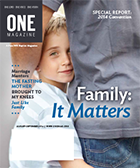
August-
September 2014
Family: It Matters
------------------
|

What to Do About Roadkill
by Brenda Evans
Roadkill is about collisions. Running into animals who wander into your path, and you can’t avoid hitting them. Human animals, I mean. People you bump into or even run over and just keep going. Perhaps God put them in your way, but you don’t notice that. You unexpectedly strike an object, briefly apply your brakes, then speed on.
You can’t predict these collisions. You and another person arrive at the same intersection at the same time, so you bump into one another. You have three options. You can say, “Excuse me,” and move on. You can avert your eyes and act as if you don’t see him. Or you can recognize the collision as a God-thing, and you stop and offer help.
Earlier this month I went for a pedicure and collided with the beautiful Sela, thoroughly tattooed and all set to beautify my feet. We had more than an hour to intersect, so while she worked her magic—massage, pumice stones, potions, and polish—we chitchatted. I found out she is 28, single, frugal, a part-time musician, Christian college alum, and cat lover. When I steered the conversation to the Lord, she was willing to talk only a bit. After the final polished stroke, she said, “You know, I’ve given up on me and God. Besides, my mother would die of a heart attack if I ever said I’d go to church again.”
In a hurry, she stuck my feet in the dryer and left the room. Conversation over. I prayed later that our brief collision would nudge her toward the Lord. And maybe, if I schedule another pedicure, I will ask for Sela.
I say maybe because people like Sela are not always on my radar. I mean people who have either given up or been given up on. People like Mephibosheth, “a dead dog,” as he called himself, despite the fact he was the grandson of the great King Saul (2 Samuel 9). He was a crippled exile, an outcast that people didn’t even bother to look at anymore— no better than roadkill. David, nevertheless, searched for him, found him in Gilead, and brought him back to Jerusalem into the royal household.
Someone said recently that the trouble with always averting our eyes and never looking at people is that if we do it often enough, we go blind and never really see anybody’s needs anymore.
Blind? Is that me? I admit that I do avert my eyes. Too often, I am the priest and Levite in Jesus’ parable. I walk by, leaving the wounded to the next fellow. Let him be the Good Samaritan. Or I don’t even see the dead dogs, nobodies, and roadkill that cross my path because I don’t look long and hard, or I fail to do anything when I do see them. It is easier for me to hover with the somebodies who can take care of themselves than to hang with the nobodies who can’t. Sometimes, I just want to sit and soak, to be content with myself, and look at nobody.
Maybe what I need is a jolt like James Still wrote about:
Last night I ran a fox over.
A sudden brilliant flash of gold,
A setting sun of gilded fur
Appeared in my car’s beam,
And then the fatal thump.
What will it take to jar me into faithful stewardship toward those I see along the way? Will it take a “fatal thump”? To Jesus, people in need were like brilliant flashes of gold in His headlights. He braked for them: the untouchable leper, the hemorrhaging woman, Jairus’ dead daughter. He held conversations with the self-satisfied. He ate with publicans, sinners, and outcasts.

And when He ascended, He left the people of the earth to me…to us, to win, teach, and watch over. His Commission reminds me of my mother. Sometimes, when I was a child and we went to town, Mother asked my sister Grace to watch out for me. Four years older and wiser, Grace would latch onto my hand and not let go. She had a vice grip. She told me what to do and not do. She would not let me get lost, taken, or hurt, go hungry, or get into trouble. Grace never averted her eyes from the job Mother gave her.
I revisited Romans 12 earlier this week, and the Lord hammered me with the idea of personal responsibility and stewardship in my work for Him. The words clanged around in my head like steel mallets on a brass gong. Stop averting your eyes. Stop running over, around, and past people with needs. Get past your chronic contentment and do something. Engage in ministries of mercy.
A ministry of mercy, I have learned, is not just a feeling. It is an action. Mercy sees a need and meets it. Of course, Jesus demonstrates this in His greatest parable on mercy: The Good Samaritan, spoken directly to the lawyer who wanted to justify his failure to give of himself and his time to help his neighbor. In the end, Jesus simply says to the man, “Go and do likewise” (Luke 10:37). I wonder if the lawyer did.
I know. I know. It’s hard to “go and do likewise.” Meeting needs takes time, compassion, kindness. It takes humility and patience to stoop down, as Romans 12 says, and serve another person. It takes effort to encourage, comfort, feed, distribute, provide. It takes time to overcome evil with good.
Not only does it take time and other graces, it also takes personal encounters with dead dogs, nobodies, and roadkill of various sorts. How will I know genuine needs unless I give face-to-face time to become acquainted and exercise discernment in how to best give the help needed? It is easier, in our natural squeamishness, pride, and impatience, to pass by. But I know that ministering stewards stop and sit and listen. They don’t just write checks or hand out $20 bills. They connect, actually touch people, actually bind up wounds. They stoop down, as Jesus did, and wash feet.
Memory is sometimes a thorn, sometimes a salve. I remember when I rarely averted my eyes. The time Bill and I took in a stranger, a paroled convict, for a few weeks. The many times hungry families came to our parsonage door, and we fed them whatever we had. I remember two neglected neighbor boys who spent long hours with our sons. A lonely seminary couple 2,000 miles from home became our spiritual children for a year.
But somewhere along the way, I’ve begun to avert my eyes more and more. Sometimes, the fox in my headlights is a scraggly-haired woman at a Virginia fast-food restaurant who asks me to help her, and I say I can’t. I’m in a hurry to get where I’m going: a spiritual retreat in the mountains.
Oh, my, what would Jesus have said to that?
About the Writer: Brenda Evans is a retired English teacher. She and her husband Bill (former director of the Free Will Baptist Foundation) live in Cattlettsburg, Kentucky. They are proud grandparents of seven.
|
|

